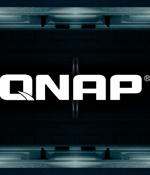Security News

QNAP is warning customers again to secure their Internet-exposed Network Attached Storage devices to defend against ongoing and widespread attacks targeting their data with the new DeadBolt ransomware strain. All QNAP users are urged to "Immediately update QTS to the latest available version" to block incoming DeadBolt ransomware attacks.

A new DeadBolt ransomware group is encrypting QNAP NAS devices worldwide using what they claim is a zero-day vulnerability in the device's software. BleepingComputer is aware of at least fifteen victims of the new DeadBolt ransomware attack, with no specific region being targeted.

Threat actors behind the Qlocker ransomware are once again targeting Internet-exposed QNAP Network Attached Storage devices worldwide. Qlocker has previously targeted QNAP customers in a massive ransomware campaign that started during the week of April 19, moving victims' files within password-protected 7-zip archives with the.7z extension after breaching their NAS devices.

Get your internet-exposed, network-attached storage devices off the internet now, Taiwanese manufacturer QNAP warns: Ransomware and brute-force attacks are widely targeting all network devices. "The most vulnerable victims will be those devices exposed to the Internet without any protection," QNAP said on Friday, urging all QNAP NAS users to follow security-setting instructions that the Taiwanese NAS maker included in its alert.

QNAP has warned customers today to secure Internet-exposed network-attached storage devices immediately from ongoing ransomware and brute-force attacks. "QNAP urges all QNAP NAS users to follow the security setting instructions below to ensure the security of QNAP networking devices," the Taiwanese NAS maker said in a press release issued today.

Users of QNAP network-attached storage devices are reporting attacks on their systems with the eCh0raix ransomware, also known as QNAPCrypt. BleepingComputer forum users managing QNAP and Synology NAS systems have been regularly reporting eCh0raix ransomware attacks but more of them started to disclose incidents around December 20.

Unsecured QNAP NAS devices are getting covertly saddled with a new bitcoin miner, QNAP has warned users. "Once a NAS is infected, CPU usage becomes unusually high where a process named '[oom reaper]' could occupy around 50% of the total CPU usage. This process mimics a normal, legitimate kernel process with the same name. However, while the legitimate kernel process PID is usually below 1000, the bitcoin miner PID is usually greater than 1000," the company explained.

Network-attached storage appliance maker QNAP on Tuesday released a new advisory warning of a cryptocurrency mining malware targeting its devices, urging customers to take preventive steps with immediate effect. "A bitcoin miner has been reported to target QNAP NAS. Once a NAS is infected, CPU usage becomes unusually high where a process named '[oom reaper]' could occupy around 50% of the total CPU usage," the Taiwanese company said in an alert.

QNAP warned customers today of ongoing attacks targeting their NAS devices with cryptomining malware, urging them to take measures to protect them immediately. Customers who suspect their NAS is infected with this bitcoin miner are advised to restart their device, which may remove the malware.

Taiwan-based network-attached storage maker QNAP has released security patches for multiple vulnerabilities that could allow attackers to inject and execute malicious code and commands remotely on vulnerable NAS devices. Three of the security flaws fixed today by QNAP are high severity stored cross-site scripting vulnerabilities affect devices running unpatched Photo Station software.